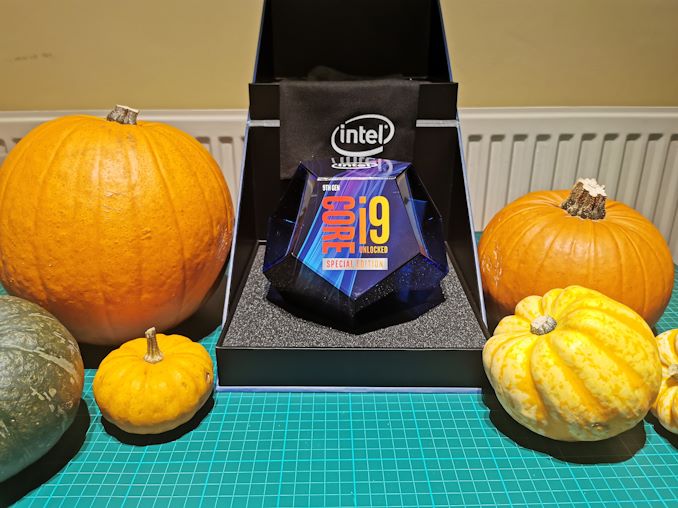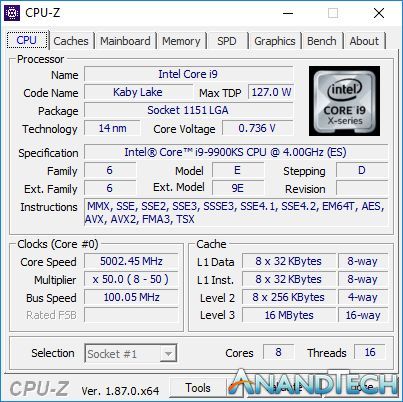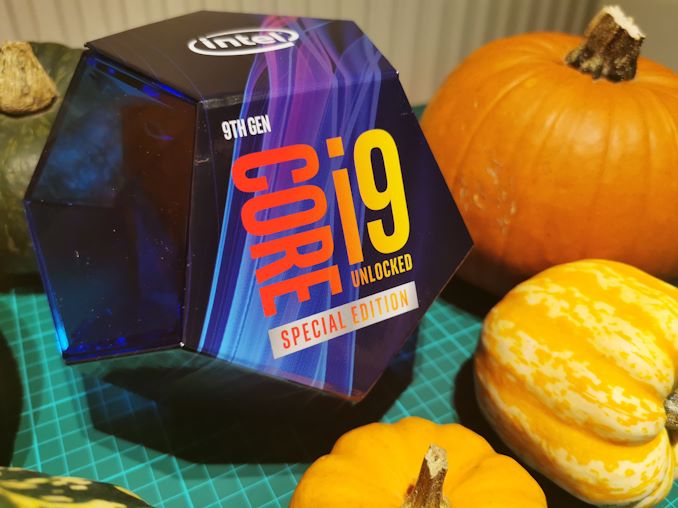The Intel Core i9-9900KS Review: The 5 GHz Consumer Special
by Dr. Ian Cutress on October 31, 2019 10:45 AM EST
Intel likes 5.0 GHz processors. The one area where it claims a clear advantage over AMD is in its ability to drive the frequency of its popular 14nm process. Earlier this week, we reviewed the Core i9-9990XE, which is a rare auction only CPU but with 14 cores at 5.0 GHz, built for the high-end desktop and high frequency trading market. Today we are looking at its smaller sibling, the Core i9-9900KS, built in numbers for the consumer market: eight cores at 5.0 GHz. But you’ll have to be quick, as Intel isn’t keeping this one around forever.
The Battle of the Bits
Every time a new processor comes to market, several questions get asked: how many cores, how fast, how much power? We’ve come through generations of promises of many GHz and many cores for little power, but right now we have an intense battle on our hands. The red team is taking advantage of a paradigm shift in computing with an advanced process node to offer many cores at a high power efficiency as well as at a good frequency. In the other corner is team blue, which has just equipped its arsenal by taking advantage of its most aggressive binning of 14nm yet, with the highest frequency processor for the consumer market, enabled across all eight cores and to hell with the power. Intel’s argument here is fairly simple:
Do you want good all-around, or do you want the one with the fastest raw speed?
The Intel Core i9-9900KS is borne from the battle. In essence it looks like an overclocked Core i9-9900K, however by that logic everything is an overclocked version of something else. In order for Intel to give a piece of silicon off the manufacturing like the name of a Core i9-9900KS rather than a Core i9-9900K requires additional binning and validation, to the extent where it has taken several months from announcement just for Intel to be happy that they have enough chips for demand that will meet the warranty standards.
At the time Intel launched its 9th Generation Core desktop processors, like the Core i9-9900K, I perhaps would not have expected them to launch something like the Core i9-9900KS. It’s a big step up in the binning, and I’d be surprised if Intel gets one chip per wafer that hits this designation. Intel announced the Core i9-9900KS after AMD had launched its Zen 2 Ryzen 3000 family, offering 12 cores with an all core turbo around 4.2 GHz and a +10% IPC advantage over Intel’s Skylake microarchitecture (and derivatives) for a lower price per core. In essence, Intel’s Core i9-9900K consumer flagship processor had a chip that was pretty close to it in performance with several more cores.
Intel is pushing the Core i9-9900KS as the ultimate consumer processor. With eight cores all running at 5.0 GHz, it is promising fast response and clock rates without any slowdown. Intel has many marketing arguments as to why the KS is the best processor on the market, especially when it comes to gaming: having a 5.0 GHz frequency keeps it top of the pile for gaming where frequency matters (low resolution), and many games don’t scale beyond four cores, let alone eight, and so the extra cores on the competition don’t really help here. It will be interesting to see where the 9900KS comes out in standard workload tests however, where cores can matter.
Intel’s 9th Generation Core Processors
The Intel Core i9-9900KS now sits atop of Intel’s consumer product portfolio. The processor is the same 8-core die as the 9900K, unlocked with UHD 620 integrated graphics, but has a turbo of 5.0 GHz. All cores can turbo to 5.0 GHz. The length of the turbo will be motherboard dependent, however.
| Intel 9th Gen Core 8-Core Desktop CPUs | ||||||||
| AnandTech | Cores | Base Freq |
All-Core Turbo | Single Core Turbo Freq |
IGP | DDR4 | TDP | Price (1ku) |
| i9-9900KS | 8 / 16 | 4.0 GHz | 5.0 GHz | 5.0 GHz | UHD 630 | 2666 | 127 W | $513 |
| i9-9900K | 8 / 16 | 3.6 GHz | 4.7 GHz | 5.0 GHz | UHD 630 | 2666 | 95 W | $488 |
| i9-9900KF | 8 / 16 | 3.6 GHz | 4.7 GHz | 5.0 GHz | - | 2666 | 95 W | $488 |
| i7-9700K | 8 / 8 | 3.6 GHz | 4.6 GHz | 4.9 GHz | UHD 630 | 2666 | 95 W | $374 |
| i7-9700KF | 8 / 8 | 3.6 GHz | 4.6 GHz | 4.9 GHz | - | 2666 | 95 W | $374 |
The Core i9-9900KS has an tray price of $513 (when purchased in 1000 unit bulk), which means we’re likely to see an on-shelf price of $529-$549, depending on if it gets packaged in its dodecanal box that our review sample came in.
Compared to the Core i9-9900K or Core i9-9900KF, the Core i9-9900KS extends its 5.0 GHz all through from when 2 cores are active to 8 cores are active. There is still no Turbo Boost Max 3.0 here, which means that all cores are guaranteed to hit this 5.0 GHz number. The TDP is 127 W, which is the maximum power consumption of the processor at its base frequency, 4.0 GHz. Above 4.0 GHz Intel does not state what sort of power to expect. We have this testing further in the review.
Competition
At present, Intel is competing against two major angles with the Core i9-9900KS. On the one side, it already has the Core i9-9900K, which if a user gets a good enough sample, can be overclocked to emulate the 9900KS. Intel does not offer warranty on an overclocked CPU, so there is something to be taken into account – the warranty on the Core i9-9900KS is only a limited 1 year warranty, rather than the standard 3 years it offers to the majority of its other parts, which perhaps indicates the lengths it went to for binning these processors.
From AMD, the current 12-core Ryzen 9 3900X that is already in the market has become a popular processor for users going onto 7nm and PCIe 4.0. It offers more PCIe lanes from the CPU to take advantage of PCIe storage and such, and there are a wealth of motherboards on the market that can take advantage of this processor. It also has an MSRP around the same price, at $499, although is often being sold for much higher due to availability.
AMD also has the 16-core Ryzen 9 3950X coming around the corner, promising slightly more performance than the 3900X, and aside from the $749 MSRP, it’s going to be an unknown on availability until it gets released in November.
| The Competition | ||||||
| Intel i9-9900KS | Intel i9-9900K | Anand Tech |
AMD 2920X |
AMD 3950X |
AMD 3900X |
AMD 3800X |
| 8 | 8 | Cores | 12 | 16 | 12 | 8 |
| 16 | 16 | Threads | 24 | 32 | 24 | 16 |
| 4.0 | 3.6 | Base | 3.5 | 3.5 | 3.8 | 3.9 |
| 8 x 5.0 | 2 x 5.0 | Turbo | 4.3 | 4.7 | 4.6 | 4.5 |
| 2 x 2666 | 2 x 2666 | DDR4 | 4 x 2933 | 2 x 3200 | 2 x 3200 | 2 x 3200 |
| 3.0 x16 | 3.0 x16 | PCIe | 3.0 x64 | 4.0 x24 | 4.0 x24 | 4.0 x24 |
| 127 W | 95 W | TDP | 180 W | 105 W | 105 W | 105 W |
| $513 | $486 | Price | $649 | $749 | $499 | $399 |
It’s worth noting here that while Intel has committed to delivering ‘10nm class’ processors on the desktop in the future, it currently has made zero mention of exactly when this is going to happen. Offering a limited edition all-core 5.0 GHz part like the Core i9-9900KS into the market is a brave thing indeed – it will have to provide something similar or better when it gets around to producing 10nm processors for this market. We saw this once before, when Intel launched Devil’s Canyon: super binned parts that ultimately ended up being faster than those that followed on an optimized process, because the binning aspect ended up being a large factor. Intel either has extreme confidence in its 10nm process for the desktop family, or doesn’t know what to expect.
This Review
In our review, we’re going to cover the usual benchmarking scenarios for a processor like this, as well as examine Intel’s relationship with turbo and how much a motherboard manufacturer can affect the performance.













235 Comments
View All Comments
liquid_c - Sunday, November 3, 2019 - link
One of the few reasons i keep reading articles from sites / news outlets like Anandtech and ArsTechnica is the fact that besides good, well developed and portrayed journalism, i also expect knowledgeable people commenting on said articles. I always learn(ed) a little bit of extra info by doing so and it pains me to see this ongoing fan war between Intel / AMD fans, Apple / *Insert any other Android vendor name* fans, etc. So instead of finding out the “ifs” and “whens” of specific tech topics, i have to skip through countless hate posts.PeachNCream - Monday, November 4, 2019 - link
People in glass houses.... liquid_c - Sunday, November 03, 2019 - Stop being such a dummy and stop acting like a rabid dog over a product that not only you will never get but clearly, it's not geared towards you.Although I agree in principal that there are a fair number of toxic comments, yours are among them so I don't think you have much room to complain while at the same time contributing to the problem.
sorten - Sunday, November 3, 2019 - link
The 65W 3700X is the star of this show.shompa - Monday, November 4, 2019 - link
The main problem is: 16 PCI lanes. You can't really connect anything to the system without starving it for bandwidth. The 16 PCI lanes are used for graphics. DMI link to the motherboards PCI lanes has a bandwidth of 3.8GB/s. 4-year-old NVme SSDs are already at 3.5GB/s. Forget using 2 NVme. Usually, the graphics card is pushed to 8PCI lanes killing 10% performance. Forget connecting fun stuff with a thunderbolt, or use high-end capture cards and so on. There is no bandwidth. AMD Ryzen 3 with X570 is a bit better: 24 PCI lanes. 16 for PCI and 2x4 for dual NVme SSD with 8GB/s support.trojtalen - Wednesday, November 6, 2019 - link
Really? In FarCry i missing Ryzen 3000 generation, why?...Sorry but in Vulkan (Strange Brigade) its shame! 65W AMD beat 250W+ intel on 5GHz? :D:D:D LOLalufan - Thursday, November 7, 2019 - link
so this has been the main front page story on this site for the last 8 Days strikes me as a little biased other CPUs come and go yet intels last gasp attempt to make something matter is upfront and centre for over a week strikes me as a little unfairjonbar - Thursday, November 7, 2019 - link
So.... În other review, Ryzen slaughtered 9900ks in blender, even 3700x is faster :)Some say in gaming it's faster than 3900x, but so is 9700k with 2080 :) 9700k is on par with 9900ks.
Other than "having the best of the best", 9900ks requires a lot more spending to open it's full potential. From this review, 3700x is really, really good all-round with minimal spending a 100$ B450 and a good 550w psu
Maxiking - Thursday, November 7, 2019 - link
Any Ryzen CPU is getting slaughtered in gaming by piss poor 9700k without HT so your point? Don't hate things just because you are too poor to afford them. We rich bois don't care. Don't forget to attend Fridays for future today.jonbar - Friday, November 8, 2019 - link
:) how could you live a day without insults.People asked why no ryzen 3000 results for blender, and slaughters is when a 127W-rated, "special edition" "all cores 5GHz all times", 550$+ CPU doesn't even manage to beat the 3700X at 325$.
People also asked why 1080 and argued that 9900ks is still better for gaming, guess what - on a 2080, de difference is not so great, other than Hitman, 9700k (piss poor? I suppose rich boys don't know that it, at the moment, is 30$ more expensive than 3700x, with no cooler AND requires the Z mobo to overclock :)
Maxiking - Friday, November 8, 2019 - link
Yeah, I am asking too why that allegedly excellent 7nm cpu with HT is unable to beat a piss poor 14nm 9700k with HT disabled? See, there is a reason why it is so cheap.Yes, it is a piss poor version of 9900k with disabled HT, the silicone quality is subpar by Intel high standards and those pieces are unable to reach 5ghz boosts with HT being enabled , so Intel disabled the HT and sell them as 9700k. Of course, I should not forget to mention that 9700k is a piss poor quality cpu only by the high Intel standards and high Intel customers standards.. We do not bother with anything below 4.7 Ghz.
By AMD standards, anything reaching 4.0 is a godly cpu and is being binned and sold as 3900x for the premium and they are pumping up to 1.55v into it so it can reach that mighty 4.3ghz boost on a single core whilst they promised 4.6ghz.
Let's wait for 3950x and the promised 4.7ghz boost. You know, I smell a trap. Not that kind of one, you pervert. 3900x is able to reach 4.6ghz for microseconds so, that 4.7ghz boost won't be most likely even measurable because such tiny time unit the boost would be active for hasn't been discovered yet.